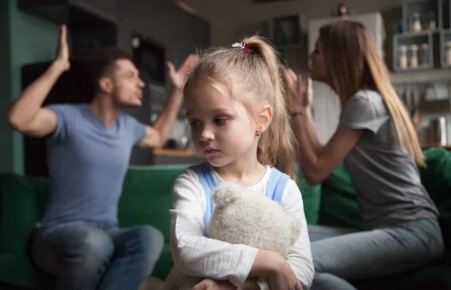Separation and divorce are often accompanied by intense emotions, difficult decisions, and complex legal and financial matters. For children and youth caught in the midst of this process, these changes can feel overwhelming. While parents may focus on navigating their own struggles, it is crucial to remember that children are significantly impacted by how their parents communicate during this time. Parents play a crucial role in helping children cope with the emotional and psychological challenges of divorce. Conversations, particularly those that involve sensitive topics, require extra care to ensure children’s well-being is protected.
Effective communication can ease the emotional burden on children, offering them a sense of security and stability during a time of upheaval. Mindful dialogue that is characterized by empathy, respect, and restraint can shield children from unnecessary distress and foster a healthier family environment in the face of change. The actions and quality of parenting during and after separation can significantly shape the outcomes of children’s lives, affecting their emotional, social, and academic well-being.
Understanding the Impact of Parental Divorce on Children
Parental divorce can profoundly affect children’s emotional, social, and psychological well-being. Research indicates that children of divorced parents are more likely to experience anxiety, depression, and behavioral issues compared to their peers from intact families. The impact of parental divorce on children can vary widely, influenced by factors such as the child’s age, the level of parental conflict, and the quality of the parent-child relationship.
According to the American Psychological Association, approximately 40% of children in the U.S. experience parental divorce, and nearly 25% show long-term emotional or behavioral challenges as a result.
Children of divorced parents often grapple with a range of emotions, including sadness, anger, and guilt. They may feel torn between their loyalty to each parent, leading to significant emotional distress. Additionally, the upheaval in their living arrangements, social relationships, and daily routines can be challenging to navigate.
Understanding these impacts is crucial for parents. By maintaining a positive and loving relationship with each child, minimizing conflict, and providing a stable environment, parents can help mitigate the negative effects of divorce. This approach not only supports children’s emotional health but also fosters a sense of security and continuity in their lives.
Why Dialogue Matters in Family Psychology
Children, even if they don’t fully understand the situation, are keenly attuned to the emotional climate of their home. They can sense tension, pick up on unspoken cues, and feel the weight of adult conflicts. The impact of marital conflict on their emotional well-being can be significant, leading to increased depressive symptoms and rule-breaking behavior. The tone and content of conversations between separating or divorcing parents can shape how children perceive themselves, their family, and their role within it.
When parents engage in open, honest, and thoughtful communication, children feel more secure, supported, and loved. In contrast, if parents communicate poorly—particularly if they vent frustrations, criticize one another, or discuss difficult matters in front of their children—the child may experience confusion, emotional distress, and anxiety. These responses can lead to feelings of guilt, fear, or divided loyalty.
Additionally, how parents manage their conflicts and employ effective parenting techniques is crucial in supporting children’s emotional health.
Moreover, children who are exposed to unhealthy communication may develop behavioural issues, such as withdrawal, aggression, or difficulties in school. Therefore, how parents engage in dialogue during a separation is crucial to safeguarding children’s emotional health.
What to Avoid in Parental Conflict

Certain types of communication can have a detrimental effect on children during separation and divorce. Parents must strive to avoid the following behaviours:
1. Discussing Legal or Financial Matters
Children should never be exposed to discussions regarding child support, property division, or other financial issues. These subjects can burden children with feelings of anxiety and make them feel as though they are somehow responsible for adult decisions. Furthermore, discussions about legal strategies or property disputes can create a sense of division and insecurity, making the child feel like they are in the middle of a battle.
2. Criticizing the Other Parent
Negative comments about the other parent—whether direct insults, complaints, or indirect criticisms—can cause immense harm to a child’s relationship with that parent. Children love both parents, and even if they understand that their parents are separated, they do not need to hear disparaging remarks. Criticizing the other parent places the child in an uncomfortable position and can lead to feelings of guilt, loyalty conflicts, and confusion.
3. Arguing in Front of Children
Heated arguments between parents are often frightening for children, who may feel unsafe or helpless during these exchanges. The emotional stress of witnessing conflict can result in heightened anxiety and emotional withdrawal. Increased levels of marital conflicts can negatively affect children, leading to adverse psychological outcomes such as increased depressive symptoms and risk for post-traumatic stress disorder.
4. Using Children as Messengers
Asking children to carry messages or act as intermediaries between parents places them in an unfair position. It puts them in the middle of conflicts they should not be responsible for navigating. It’s essential to maintain direct communication between parents, avoiding placing children in the role of messenger or mediator.
Mental health professionals and Parenting Coaches play a crucial role in providing support and guidance to parents navigating divorce. They can help create effective parenting plans tailored to children’s developmental needs and assist in managing parental conflict, ultimately contributing to healthier outcomes for children during and after family disruptions.
Effective Co-Parenting Strategies
Co-parenting after a divorce requires a high level of cooperation and communication between parents. Effective co-parenting strategies can significantly reduce conflict, promote positive parent-child relationships, and provide a stable environment for children involved.
One key strategy is developing a comprehensive co-parenting plan that clearly outlines each parent’s responsibilities and expectations. Establishing a regular communication schedule to discuss child-related issues can also help maintain consistency and prevent misunderstandings. It’s essential to avoid conflict and tension in front of the children, as this can create a stressful environment.
In high-conflict situations, parallel parenting where direct communication is minimized, and structured boundaries are usedcan be a healthier alternative to traditional co-parenting, reducing opportunities for conflict.
Maintaining a consistent routine for the children is another critical aspect of effective co-parenting. This predictability helps children feel secure and understand what to expect. Additionally, showing respect and empathy towards each other as co-parents sets a positive example for the children and fosters a cooperative co-parenting relationship.
By implementing these strategies, divorced parents can work together to create a loving and stable environment for their children, even in the absence of a romantic relationship.
Children of different ages process divorce in distinct ways. Tailoring your communication based on their developmental stage ensures your message is supportive and age-appropriate.
Strategies for Appropriate Communication to Help Children Cope
To ensure that children remain protected from the emotional turbulence of divorce or separation, parents can employ several strategies to guide their communication:
1. Create a Safe Space for Sensitive Conversations
Sensitive discussions should occur in private, away from the children’s hearing or presence. This ensures that difficult topics are handled in a space where the child does not feel burdened or exposed to emotional turmoil. It also allows for more thoughtful, respectful exchanges without the immediate need for emotional self-regulation in front of the children.
2. Maintain a Respectful Tone
When communicating with the other parent, particularly in front of children, maintaining a respectful and neutral tone is crucial. Even if frustrations arise, speaking with civility and professionalism sets a healthy example for children and teaches them how to handle conflict maturely. By modelling respect, parents provide children with a framework for managing their own relationships and emotions.
3. Focus on Reassurance and Love
Reassuring children during this period is vital. Children need to hear from both parents that the separation is not their fault and that both parents continue to love them. A consistent message of unconditional love helps alleviate fears and prevents children from internalizing the separation as a personal failure.
4. Use Age-Appropriate Language
When discussing the separation with children, it’s essential to use language that is age-appropriate and avoids overwhelming them with unnecessary details. Younger children may need simple explanations, while older children may need more information. However, in all cases, parents should refrain from overloading children with adult concerns that they are not equipped to process.
5. Collaborate on Communication
Both parents should agree on how to communicate about the separation to the children. A consistent message helps minimize confusion and emotional turmoil. When parents present a united front, it offers a sense of stability and prevents children from feeling torn between two conflicting viewpoints. This is especially important in situations where a child is involved in the communication process with at least one parent.
6. Seek Professional Guidance
In some cases, a neutral third party—such as a family therapist, mediator, or divorce coach—can be invaluable. Professionals can offer guidance on how to manage difficult conversations, provide strategies for co-parenting, and facilitate communication between parents when tensions are high. Additionally, involving a neutral party can help reduce the emotional intensity of discussions, benefiting both parents and children.
The long-term emotional impact of divorce on adult children is significant. Adult children of divorce often struggle with feelings of abandonment, confusion about love, and the loss of their ‘first family,’ which shapes a unique worldview different from those of children from intact families.
Fostering Resilience in Children of Divorced Parents

Fostering resilience in children of divorced parents is essential to help them cope with the challenges and changes in their lives. Resilience, the ability to bounce back from adversity, can be nurtured through various strategies and techniques.
Providing a stable and predictable environment is fundamental to fostering resilience. Encouraging open communication and allowing children to express their emotions freely helps them process their feelings and develop emotional intelligence. Promoting positive relationships with each parent and other supportive adults also provides a strong support network for the children.
Encouraging children to develop problem-solving skills and coping strategies equips them with tools to handle challenges effectively. Fostering a sense of control and agency in their own lives empowers children and helps them feel more secure and confident.
By focusing on these strategies, parents can help their children develop the resilience needed to navigate the challenges of divorce and thrive despite the changes in their family dynamics.
The Benefits of Mindful Communication for Divorced Families
By protecting children from the stress of parental conflict, mindful communication fosters emotional resilience in children of divorce. Children are more likely to:
- Maintain positive relationships with both parents.
- Develop healthy coping strategies for dealing with change.
- Feel supported and secure during a difficult time.
Children from divorced families may face a higher likelihood of experiencing negative outcomes compared to those from non-divorced families.
When parents prioritize respectful communication, they pave the way for healthier family dynamics, both during and after the separation process.





